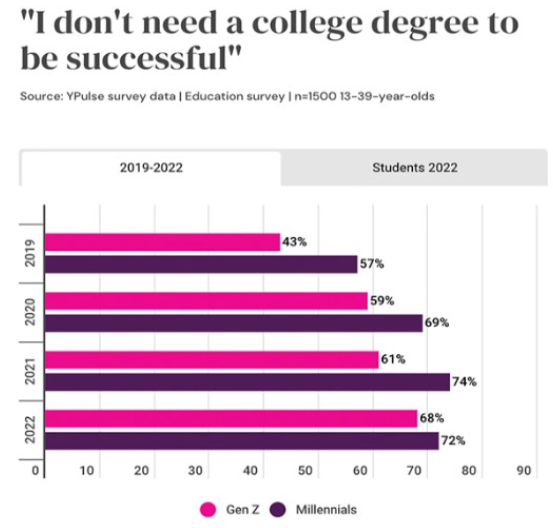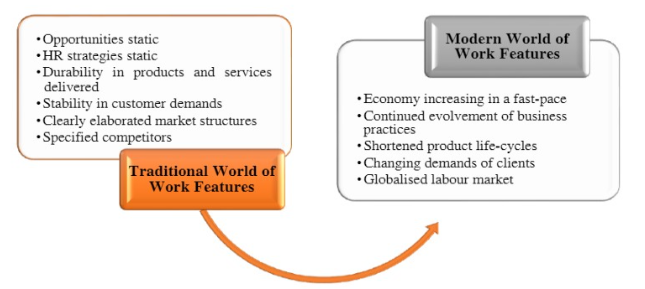According to Forbes, in the past decade, college enrollment has dwindled by about 10%, which is approximately 1.95 million students. Since 2010, the trend has been declining (Schroeder). This could be due to a combination of reasons that include the changing employment landscape with the advent of new technologies such as artificial intelligence that afford rapid learning and task accomplishment, companies eschewing their mandatory degree requirement in favor of advantageous technical skills, or the boom in alternate learning platforms that provide quick certifications and hands-on training to enhance competence. This research paper aims to analyze the various factors contributing to the change in Gen Z’s mindset, as many choose to skip college and enter the workforce without a formal degree but with strong skills.
A YPulse survey indicates that both Gen Z and millennials strongly believe that they do not necessarily need a college degree to be successful. In 2019, 43% of the Gen Z population held this opinion, and by 2022, it had risen to 68% (Bay). One of the reasons for this surge is that the social stigma of not attending college is weakening, and students are evaluating the worthiness of a college degree and comparing it to the other factors that are valued in today’s marketplace, such as work experience, high school degrees, internships, and industry connections. Figure 1 graphically illustrates this point.

With the recent emphasis placed by business leaders and corporations on digitization, automation, and the use of artificial intelligence to extract value from voluminous data, there is a skills gap among workers to meet these growing demands. There are not enough human resources available to complement and leverage the value of new technology (Elayan 4593). The Gen Z population is acutely aware of this need and is striving to fill this void by learning rapidly from the internet to become job-ready. The modern world of work features five unique aspects that Gen Z individuals are trying to grasp. These include the quick pace of the economy, rapidly evolving business practices, short product life cycles, new and unique client demands, and the globalization of the labor market, which makes it more competitive (Elayan 4595). These aspects are propelling Gen Z to bypass formal degrees and look for other ways to enhance their competency and knowledge acquisition.

The rise of Gen Z professionals without formal university degrees is a byproduct of the rapid transformation that is taking place in the digital job market, where certifications are fast replacing traditional academic qualifications. Gen Z professionals are an untapped talent pool that businesses are trying to exploit through skills-based hiring and continuous learning (Rachmad). As a result of this practice, Gen Zs are more inclined to skip higher education opportunities in exchange for valuable skills that will make them job-ready and part of an in-demand workforce. More and more organizations are creating corporate training opportunities to help facilitate this transition. Even learning platforms are offering microcredentials that help prepare professionals for the new job roles in the Industry 4.0 era.
This industry 4.0 era is not just about new technology, as it is also about novel ways of working and the changing roles of professionals. As such, Gen Zers trying to enter the workforce see this as an opportunity to find their place as traditional roles are rapidly being phased out and replaced by technology-based roles. This is a shift in the Gen Z attitude whereby they are not just focused on earning a formal degree but keeping an eye on quick labor market entry points where they just need to get skilled or upskilled and compete for open positions (Bi?czycki and Dorocki). As a result of this, many younger individuals place less significance on going through the traditional route of getting a degree, acquiring skills, and then applying for jobs when they are aware of alternative options that are equally viable but more expedient.
According to a Deloitte survey of Gen Zs and millennials, because of the changing work landscape, these groups are re-evaluating the capabilities they need to possess to become valuable to employers. Many are already trying to craft a career path for themselves that includes components for a work-life balance, meaning, purposeful work, and well-being. These groups are more interested in rapidly growing their technical and soft skills, which will make them qualified for the new-age job roles that rely upon evolving technologies. Many Gen Zs cite numerous factors for not being interested in pursuing higher education. Among the prominent ones are financial constraints, the desire to pursue entrepreneurship, the need for learning flexibility, a lack of interest in traditional education, and the feeling that a degree will not provide them the skills that are required in the rapidly evolving marketplace (Deloitte). The snapshot below captures the percentage of the Gen Z population that is not inclined to pursue a degree.

Furthermore, approximately 31% of Gen Zs in the survey for 2025 decided not to pursue higher education, as they feel that the existing education system does not prepare them for the job market. This does not mean that they do not value the traditional approach, just that they understand the new needs and are adapting to them. On the contrary, there is a clear trend that Gen Zs are stressing continuous learning and development opportunities as a way to stay abreast of industry trends. This has led to the exploration of alternative paths such as apprenticeships, vocational qualifications, and skills-based learning. This is congruent with the new talent-without-degrees world order, where qualifications are being replaced by competence and certifications (Rachmad). Many universities are already taking notice of this need and offering micro-credentials to take care of the learners’ need for lifelong learning and upskilling. The fourth and fifth industrial revolutions are changing the education landscape, and the inability to keep pace with the marketplace’s requirements is resulting in lower Gen Z enrollments (Lang). As the survey indicates, a growing number of Gen Zs are unable to align their career needs with their educational degrees.
The old way of looking at college attendance as non-negotiable is no longer the same. Many who had it drilled into their heads that college is an integral part of the learning experience are now witnessing a paradigm shift for Gen Zs who want to pursue entrepreneurship. Richard Branson, founder of the Virgin Group, states “they may be better off skipping college and getting on with it” (Royle). He believes that it would be more advantageous for Gen Zs to get the necessary experience in the industry rather than going to college and piling up a lot of debt. The above trends indicate that there is a change in the general mindset towards contrarian ways of crafting a career.
Recent research confirms this, as close to 81% of Gen Zs now fear the risk of choosing the wrong career pathway due to the rate of change. This is coupled with the 81% of employers who think that while hiring, they should give more importance to skills than to degrees. In addition, 74% of Gen Z agree that they want to be employable in the future rather than simply getting a degree. As per one employer, “if an individual is skilled for the task, then a piece of paper should not matter” (American Student Assistance and Jobs for the Future). Such employer sentiments change the perceptions of Gen Zs and reinforce their belief that pursuing a degree is not a prerequisite for them to enter the workforce. Hence, this leads to a decline in college enrollments, as they have planned out alternate ways to upskill.
Conclusion
Recent statistics demonstrate a significant shift in the mindset of Gen Zs, leading to a fundamental transformation in their approach to career building. While there are multiple factors leading to this transformation, industry forces and new business practices are propelling it, and this is the reason Gen Zs have a mindset that is different from the traditional way. Organizations need job-ready professionals who can be swiftly onboarded into the system. Gen Zs comprehend this change and do not want to be burdened under the weight of student loans and an uncertain career, especially in light of the evolving technological landscape. This group is ready to risk missing out on the advantages of a traditional educational approach for the sake of a more fluid approach where they have more freedom and choice to pursue whatever they need to thrive in the marketplace. Companies are also helping them through in-house training programs and micro-learning opportunities. Due to these factors, Gen Zs are finding it prudent to skip getting a formal college degree and invest their time in getting skilled through certifications and experience. This approach makes them job-ready and in demand for industry opportunities, which they would have to miss out on if they were to take a traditional approach. The rate of change with technology is such that Gen Zs understand that they cannot afford to learn something that might become outdated by the time they are ready to enter the workforce.
Works Cited
American Student Assistance and Jobs for the Future. “Degrees of Risk: What Gen Z and Employers Think About Education-to-Career Pathways…and How Those Views Are Changing – Expand Opportunities.” Expand Opportunities, 13 Oct. 2022, expandopportunities.org/knowledge-hub/degrees-of-risk. Accessed 28 June 2025.
Bay, Joshua. “Gen Z’s Declining College Interest Persists — Even Among Middle Schoolers.” The74, 24 Aug. 2023, www.the74million.org/article/gen-zs-declining-college-interest-persists-even-among-middle-schoolers. Accessed 25 June 2025.
Bi?czycki, Bernard, and S?awomir Dorocki. “Industry 4.0: A Chance or a Threat for Gen Z? The Perspective of Economics Students.” Sustainability, vol. 14, no. 14, July 2022, p. 8925, doi:10.3390/su14148925.
Deloitte. “Deloitte Global Gen Z and Millennial Survey 2025.” Deloitte, 14 May 2025, www.deloitte.com/global/en/issues/work/genz-millennial-survey.html. Accessed 28 June 2025.
Elayan, Malek Bakheet. The New World Of Work And Digital Learning: Millennials And Generation Z. 30 Dec. 2022, www.researchgate.net/publication/366701617. Accessed 28 June 2025.
Lang, Josephine. “Workforce Upskilling: Can Universities Meet the Challenges of Lifelong Learning?” International Journal of Information and Learning Technology, vol. 40, no. 5, Feb. 2023, pp. 388–400, doi:10.1108/ijilt-01-2023-0001.
Rachmad, Yoesoep Edhie. Talent Without Degrees: Managing Gen Z with Competence and Certification. 2025.
Royle, Orianna Rosa. “Richard Branson Says Gen Z Should Skip College and Get on With It.” Fortune Europe, 4 Oct. 2024, fortune.com/europe/2024/10/04/gen-z-own-boss-billionaire-richard-branson-ditch-college.
Schroeder, Bernhard. “College Enrollment Is Down. Is Gen Z Losing Faith in a Degree? For Entrepreneurs and Others, This Might Be the Answer.” Forbes, 4 Dec. 2023, www.forbes.com/sites/bernhardschroeder/2023/12/04/college-enrollment-is-down-is-gen-z-losing-faith-in-a-degree-for-entrepreneurs-and-others-this-might-be-the-answer. Accessed 25 June 2025.








